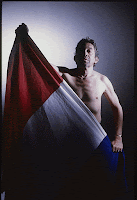I.
Joe Strummer and Mick Jones of the Clash were not the only white recording artists to leave the safety of their European homes in the late 1970s [1] and travel to Kingston Jamaica in the hope of finding inspiration.
Always happy to hop on the latest bandwagon and experiment with musical genres, the French singer-songwriter Serge Gainsbourg also flew to the Caribbean island, in September 1978, with the intention of recording a reggae album with super-talented local musicians and producers Sly Dunbar and Robbie Shakespeare [2].
Surprisingly perhaps, it was the 50-year-old Frenchman - whom many regarded by this date as past his prime - and not the younger, cooler duo of English punks then at the top of their game, who seemed to have a better time of it in Jamaica and fit in more easily with the scene; particularly when it was discovered that he was the man responsible for the notorious love song 'Je t'aime ... Moi non plus'.
And it was Gainsbourg, not the Clash, who arguably made the more challenging album ...
II.
Released in March 1979, four months after the Clash released their second studio album, Give 'Em Enough Rope - a fairly standard rock record with minimal Jamaican influence, apart from on the opening track - Gainsbourg's Aux armes et caetera is a unique but genuine reggae album; i.e., one recorded in Kingston and featuring some of Jamaica's best reggae musicians, as well as vocal support from members of Bob Marley's backing group, the I Threes [3].
The album, which has since been remixed, dubbed, and expanded with previously unused material, is now considered an absolute classic (and I'm not sure that's something that can be said of Give 'Em Enough Rope) and has gone on to sell over a million copies.
The title track, released as a single, is probably the most notorious; a reggae adaptation of 'La Marseillaise' that is guaranteed to offend the more conservative and reactionary sections of French society. Indeed, it provoked an equivalent amount of media-driven outrage as 'God Save the Queen' by the Sex Pistols had produced in the UK in the summer of '77 [4].
Gainsbourg, however, was so happy with the album and so taken with reggae as a genre, that he recorded another album in 1981, Mauvaises nouvelles des étoiles, employing the same Jamaican musicians and backing vocalists (even though Bob Marley was less than pleased to discover that Gainsbourg had persuaded his wife Rita to sing erotic lyrics).
This album too was eventually given a dub-style remix a decade after Ganisbourg's death (in 2003) and continues to find new fans, although it isn't a patch on Aux armes et cætera and pales in comparison.
III.
Whether performing Aux armes et caetera live on tour was Gainsbourg's idea or
his record company's isn't known, but it was Gainsbourg who insisted that they fly
his Jamaican support band - the Revolutionaries [5] - over from Jamaica (sadly, the I Threes were not invited along for the ride).
The short tour in culminated in a number of Paris gigs - the first of which was attended by various French artists and intellectuals (including Roland Barthes) - although it was the show in Strasbourg (4 Jan 1980) that is often best remembered, after a group of angry ex-paratroopers threatened to violently disrupt the event.
Deciding to courageously confront - whilst at the same time disarm the protestors - Gainsbourg walked on stage alone and sang the national anthem, in its traditional form, amusingly obliging the soldiers to stand, salute, and sing along [6].
by Jean-Jacques Bernier (1985)
Notes
[1] See the recent post 'Where Every White Face ...' (11 Jan 2025): click here.
[2] For the full story of this working trip to Jamaica, made at the suggestion of Gainsbourg's producer and musical director, Philippe Lerichomme, see the article by Sylvie Simmons entitled 'Serge Gainsbourg: the Reggae Years' on the Red Bull Music Academy website (26 Oct 2015): click here.
Ms. Simmons is the author of the first English biography of Serge Gainsbourg - Serge Gainsbourg: A Fistful of Gitanes (Helter Skelter, 2001).
[3] Aux Armes et caetera (Universal, 1979) was the first time a white artist had recorded a full reggae-influenced album in Jamaica. The I Threes consisted of Marcia Griffiths, Rita Marley, and Judy Mowatt.
[4] Gainsbourg received (all-too-predictable) death threats upon release of his reggae cover of the
French national anthem. But, bravely, he neither backed down nor apologised. In fact, after purchasing the signed manuscript of 'La
Marseillaise' at an auction, in 1981 (for a sum of 135,000 francs), Gainsbourg argued that his take was closer to the original
than any other recorded version (not least of all in revolutionary spirit).
For full details of the reaction in France to Aux armes et caetera, see Sylvie Simmons 'Serge Gainsbourg: the Reggae Years', as linked to above. And to listen to the track, please click here, or here where it comes with an accompanying video.
[5] The Revolutionaries were a Jamaican reggae band, formed in 1975. Moving away from roots reggae, they created the new (more aggressive) rockers style. Over the years, numerous musicians played in the band, including Sly & Robbie (on drums and bass respectively). The Revolutionaries played on various dub albums and recorded as a backing band for many artists, including Serge Gainsbourg.
[6] Again, for further details, see Sylvie Simmons, 'Serge Gainsbourg: the Reggae Years', as previously linked to. To watch a French TV report from the time with footage from Strasbourg, click here.

